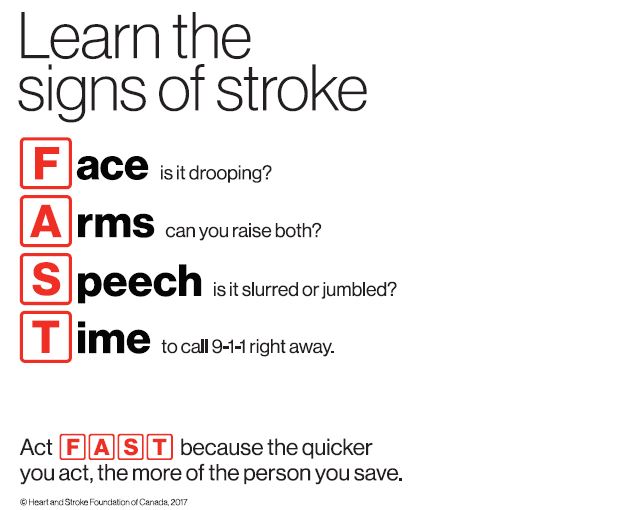Signs and symptoms of stroke
Learn the signs and symptoms of a stroke.
On this page
The signs and symptoms of a stroke are the same for both men and women.
Symptoms can happen suddenly or they can come and go over a few days. The main warning signs and symptoms of stroke include:
- weakness on one side of your body
- numbness or tingling in your face, arm or leg
- trouble speaking or understanding what others say
- vision problems, such as double vision or being unable to see, especially in one eye
- dizziness, such as losing your balance, especially if you are also showing other signs

Learn the signs of a stroke
- FACE - is it drooping?
- ARMS - can you raise both?
- SPEECH - is it slurred or jumbled?
- TIME - to call 9-1-1 right away.
Act FAST because the quicker you act, the more of the person you save.
© Heart and Stroke Foundation of Canada, 2014
Mini-stroke
Some people experience what is called a mini-stroke. This is when a blood vessel becomes briefly blocked by a small clot and you are affected for less than 24 hours.
The symptoms of a mini-stroke are the same as a stroke. Even if the symptoms go away quickly, see your health care provider. Without treatment, you could be at risk for stroke within 5 years. A mini-stroke is a warning that there is something seriously wrong with how blood is flowing to the brain.
If you or anyone you know has any of the warning signs, call 911 or your emergency number right away. You could help improve survival and recovery.
The first 4 and a half hours after a stroke are very important for getting medical help. You might be able to take drugs that can reduce or undo the effects of a stroke.
Always take an ambulance if you think you might have had a stroke. You may not realize you are unable to focus properly to drive. If you can, bring someone who has been with you while you experienced symptoms. They can give important information about your symptoms to your health care provider.
Ideally, you should be at the hospital within the first hour after your symptoms start. Do not:
- lie down to rest
- wait to see if the symptoms go away
- wait to see if you have any pain, as there may be no pain with a stroke
- while the risk for a stroke increases as you get older, even young people can have a stroke
Go to the hospital even if more than 4 and a half hours have passed or your symptoms have disappeared. If you have had a mini-stroke, the symptoms disappear within 24 hours but you still need to go to the hospital.
If you experience signs of a stroke, you should call 9-1-1 or your emergency medical number immediately. Your health care provider may conduct a number of tests to determine if you have had a stroke. If you have had one, they will find out what type of stroke you experienced.
If you have symptoms of stroke, your health care provider will determine if you had one and its type. They may use a number of tests.
For more information
- Heart and Stroke Foundation
Page details
- Date modified: